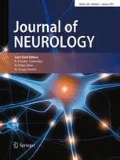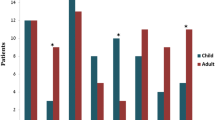Abstract
Japanese encephalitis (JE) is usually a monophasic disease; however, in rare cases, patients with JE may have an early relapse after a partial recovery, giving rise to a biphasic pattern for the disease. In this study, we report three pediatric cases in which post-JE relapse was characterized by movement disorder and/or behavioral problems, and was related to anti-N-methyl-d-aspartate receptor (NMDAR) immunoglobulin G (IgG). Serum and cerebrospinal fluid were examined for anti-NMDAR IgG in three patients who had confirmed JE and then developed relapsing symptoms which were similar to those of anti-NMDAR encephalitis. The main symptoms of the two young children were choreoathetosis, irritability, and sleep disorder; while for the teenager, agitation, mutism, rigidity, and sleep disorder were the main symptoms. Samples of cerebrospinal fluid from all patients were positive for anti-NMDAR IgG, and all patients gradually improved with immunotherapy. Testing for NMDAR antibodies is highly recommend in patients with JE, especially those with a relapsing syndrome involving movement disorder and/or behavioral problems, as these patients may benefit from immunotherapy.


Similar content being viewed by others
References
Vaughn DW, Hoke CH Jr (1992) The epidemiology of Japanese encephalitis: prospects for prevention. Epidemiol Rev 14:197–221
Pradhan S, Gupta RK, Singh MB, Mathur A (2001) Biphasic illness pattern due to early relapse in Japanese-B virus encephalitis. J Neurol Sci 183:13–18
Florance NR, Davis RL, Lam C et al (2009) Anti-N-methyl-d-aspartate receptor (NMDAR) encephalitis in children and adolescents. Ann Neurol 66:11–18
Armangue T, Leypoldt F, Malaga I et al (2014) Herpes simplex virus encephalitis is a trigger of brain autoimmunity. Ann Neurol 75:317–323
Hacohen Y, Deiva K, Pettingill P et al (2014) N-methyl-D-aspartate receptor antibodies in post-herpes simplex virus encephalitis neurological relapse. Mov Disord 29:90–96
Bamford A, Crowe BH, Hacohen Y et al (2015) Pediatric herpes simplex virus encephalitis complicated by N-methyl-d-aspartate receptor antibody encephalitis. J Pediatric Infect Dis Soc 4:e17–e21
Graus F, Titulaer MJ, Balu R et al (2016) A clinical approach to diagnosis of autoimmune encephalitis. Lancet Neurol 15:391–404
Titulaer MJ, McCracken L, Gabilondo I et al (2013) Treatment and prognostic factors for long-term outcome in patients with anti-NMDA receptor encephalitis: an observational cohort study. Lancet Neurol 12:157–165
Suleiman J, Brilot F, Lang B, Vincent A, Dale RC (2013) Autoimmune epilepsy in children: case series and proposed guidelines for identification. Epilepsia 54:1036–1045
Hoftberger R (2015) Neuroimmunology: an expanding frontier in autoimmunity. Front Immunol 6:206
Titulaer MJ, Leypoldt F, Dalmau J (2014) Antibodies to N-methyl-d-aspartate and other synaptic receptors in choreoathetosis and relapsing symptoms post-herpes virus encephalitis. Mov Disord 29:3–6
Acknowledgements
We would like to express our sincere gratitude to all the patients and their families who participated in this study. We also thank all the medical and allied health staff members who cared for the children in this study.
Author information
Authors and Affiliations
Corresponding author
Ethics declarations
Conflicts of interest
The authors declare that they have no conflict of interest.
Ethical standards
Informed consent was obtained from the parents or legal guardian of each child. The study was approved by the ethics committee of the Children’s Hospital of Chongqing Medical University.
Rights and permissions
About this article
Cite this article
Ma, J., Zhang, T. & Jiang, L. Japanese encephalitis can trigger anti-N-methyl-d-aspartate receptor encephalitis. J Neurol 264, 1127–1131 (2017). https://doi.org/10.1007/s00415-017-8501-4
Received:
Revised:
Accepted:
Published:
Issue Date:
DOI: https://doi.org/10.1007/s00415-017-8501-4




